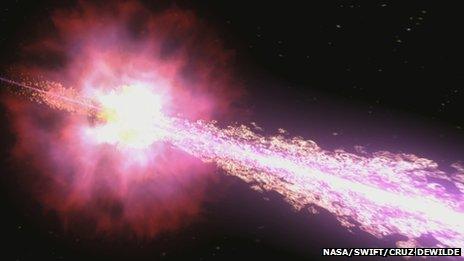Gamma-ray burst brightest ever seen
- Published

The artist's impression shows the explosion, which is the brightest seen to date
A cosmic explosion caused by the death of a massive star has been analysed by scientists.
The blast of radiation, called a gamma-ray burst, was spotted earlier this year by space-based telescopes and has been confirmed as the brightest ever seen.
Researchers believe the distant star was about 20-30 times the mass of the Sun.
The findings are published in the journal Science, external.
The researchers say it took the light from this event about four billion years to reach us.
Astronomer Prof Paul O'Brien, from the University of Leicester, said: "These events can happen in any galaxy at any time. We have no way to predict them."
Devastation
The monstrous blast from the dying star was spotted by Nasa's Swift, external and Fermi, external space-based telescopes.
The explosion would have lasted for less than a minute, but hurled radiation across the cosmos.
"The star was previously living quite happily, fusing material in its core. And then it ran out of fuel," explained Prof O'Brien, who is part of the Swift team.
The core of the star would have collapsed into a black hole, while liberating a powerful jet of energy - the gamma-ray burst.
A blast wave would have also caused the rest of the star to expand outwards, creating another dazzling event called a supernova.
"We can see the decaying light - the remnants of both events - for weeks or months afterwards," said Prof O'Brien.
Although the event was closer to Earth than most gamma-ray bursts that have been detected, the radiation would have posed no danger.
Once it reached our planet, the energy would have been absorbed by our atmosphere.
However if a similar explosion happened closer to home, within a distance of 1,000 light years, it could damage the ozone layer, with devastating consequences for life on Earth.
"The prediction is that there would be one [gamma-ray burst] close to the Earth to do us harm every 500 million years," said Prof O'Brien.
"At some point in the Earth's history we probably were irradiated by a gamma-ray burst, and it will happen again at some point in the future.
"But the chances of it happening in our lifetime are very low."
Follow Rebecca on Twitter, external
- Published18 July 2013
- Published18 April 2013
- Published21 January 2013
- Published13 May 2011